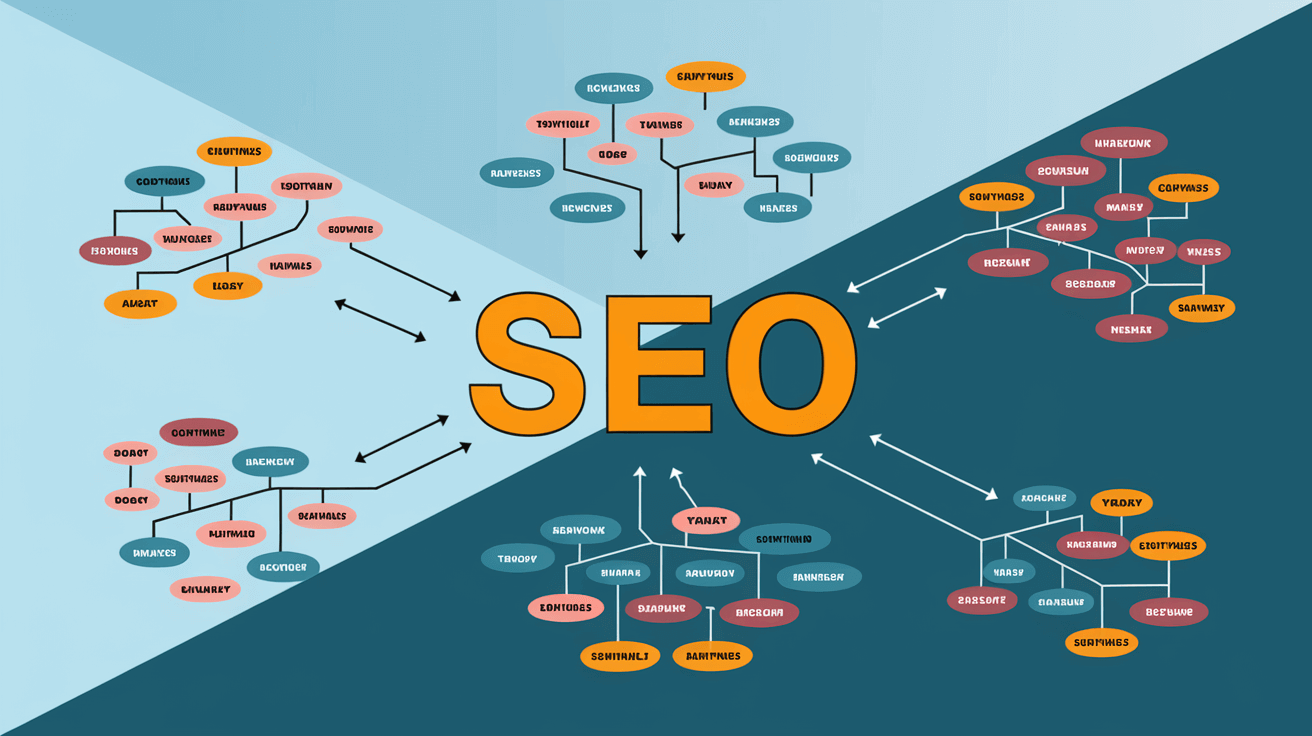Semantic analysis has been used by search engines such as Google to better interpret human language and give users with more relevant search results.
LinkWhisper
The ultimate internal linking plugin for WordPress that can elevate your on-page SEO. Recognized as the finest in the field. Simple to install with powerful features.
As a result, a single-keyword strategy to SEO is no longer adequate.
Instead, semantic SEO takes into account Google’s deep learning and natural language processing algorithms.
Site owners that use semantic SEO tactics are more likely to get industry topical authority.
They may also easily surpass competitors for relevant specialized keywords.
What Is Semantic SEO?
The technique of adding meaning and thematic depth to online material is known as semantic SEO. This allows Google crawlers to better comprehend your material. You also assist them in seeing it as high-quality and so promoting it more often in the SERPs.
Semantic SEO is the process of giving online material greater significance and thematic depth. This helps Google crawlers better grasp your content. You also assist them in considering your content to be of high quality and hence ranking it higher in SERPs.
When Google and other search engines began using artificial intelligence and natural language processing to comprehend searcher intent and the meaning of a query in 2011, they began evaluating inquiries and web pages based on keywords.
Also Read: 3 SEO Strategies that Drive Visibility on Google SERP
As search engines became smarter and began to investigate the real meaning of words, content owners began to not only generate but also describe web sites utilizing linked open data and semantic web technologies.
The introduction of the schema.org vocabulary, a 2011 project initiated by the world’s top search engines (Bing, Google, and Yahoo!) to create a uniform data schema framework for defining web pages, makes this feasible.
SEOs may now study schema in the context of Semantic SEO and learn about its changing elements. Displaying stars in product search results, for example, can increase clicks and is worth understanding more about.
Why Is Semantic SEO Important?
Back in the day, Google judged a page’s topic entirely on keywords.
Context is required for search engines to effectively comprehend a search query and give relevant results. Contexts are produced by combining words, phrases, and other word and link combinations discovered in knowledge sources like as encyclopedias and big text corpora.
Semantic SEO is a marketing method that boosts website traffic by offering meaningful metadata and semantically relevant content that answers a certain search intent explicitly. It is also a method of creating content clusters that are semantically classified into subjects rather than keywords.
In a well-known Google patent on context vectors, the word “horse” is used as an example. A “horse” is an animal for a horseman, a working instrument for a carpenter, and sports equipment for a gymnast, all having various connotations in different situations.
Also Read: How Does SEO Work?
Content is cataloged and structured around each context in semantic search engine optimization, much like Wikipedia, so that machines can comprehend and assess its originality.
Google And Semantic SEO
Google’s ranking system was significantly less sophisticated in the early days of SEO.
Crawlers simply searched a website for specified keywords to determine meaning and relevance.
But we all know that understanding human language involves far more than just the words we employ.
Context, facial expressions, tone, and the paragraphs before and following our statements all have an influence on their meaning.
This is why Google has worked hard to analyze and rank online content in a more human-like and semantic manner.
Some of the most significant turning moments in this endeavour have been:
- Google Knowledge Graph: A massive, complex knowledge base that crawlers utilize to understand the relationships between certain items and ideas.
- Hummingbird: An algorithm upgrade released in 2013 that allows Google to better grasp the meaning and context of queries, reducing the focus on individual keywords.
- RankBrain: A machine learning system introduced in 2015 that assists Google in better interpreting search intent and so providing users with more relevant search results.
With these developments, Google can look at a piece of information and grasp not just the topic it covers, but also the associated subtopics, phrases, and entities, as well as how all of those notions interact.
How Semantic SEO Improves Search Results
Why is there such a focus on semantic SEO?
Google, on the other hand, is always working to improve search for consumers.
When people use Google, they aren’t always seeking for a precise answer; they’re typically attempting to get a better understanding of a topic.
Assume a user enters in the search phrase “what are backlinks?
They will very certainly have more inquiries when they have found their solution, such as:
- How can I obtain backlinks?
- How can I obtain backlinks?
- How many backlinks am I going to need?
- Can I purchase backlinks?
- What is the distinction between white and black hat links?
- As well as others!
In terms of the search experience, finding a single piece of material that answers all of those connected queries is considerably superior to finding separate pieces of content for each individual query.
Overall, semantic SEO enhances the search experience for users.
It enables customers to obtain more detailed information without having to continuously return to the search box.
The Benefits of Semantic SEO
Those that use semantic technology to construct a semantic SEO strategy see incredible outcomes. According to our team’s study, structured data is appealing in terms of digital marketing.
For example, after three months of using structured data on the design-focused website freeyork.org, we found the following improvements in metrics:
- +12.13 percent more new users
- +18.47 percent more organic traffic
- +2.4X more page visits
- +13.75 percent more session time
- More organic search keyword ranks.
- Increased content quality signals to Google spiders.
- Searchers will see your brand as having more authority and competence.
- Assisting Google in seeing your brand as a separate entity with competence in key areas.
- Features such as Passage Ranking or People Also Ask
- More chances for internal connecting.
- Keeping people on your website rather than returning to search.
Semantic SEO is here to stay, and knowing what’s happening and the opportunities this new approach to search engine optimization provides may help your company develop immensely.
Not only will search engines better comprehend your material, but you’ll also be offering people with pertinent information that will convert them into customers more readily. This will provide you with a strategic advantage, keeping you one step ahead of your opponents.
7 Semantic SEO Strategies to Improve Your SERP Rankings
Semantic SEO comprises a variety of tactics that you may have either heard about or implemented in your SEO initiatives.
They are all focused on increasing subject depth and better communicating the meaning of online material when combined.
1. Target Keyword Clusters
Because Google does not rely on a single term per page, your content team should optimize your web pages for numerous keywords inside the same semantic cluster.
Keyword clusters are collections of terms that are semantically related.
By optimizing for these keyword clusters, you may increase the overall number of keywords for which your content ranks and add additional significance to your content.
The truth is that Google already ranks our landing pages for various keywords.
Keyword clustering is all about utilizing Google’s powerful semantic skills to increase the overall number of keywords for which our content ranks.
That implies more chances for organic clicks.
2. Increase topical depth and content length
The most basic semantic SEO approach is to lengthen your online content by providing a more in-depth examination of your topic.
Despite the fact that content length is not an official ranking criterion, lengthier material is more likely to include stronger semantic signals.
Several studies have also found a substantial relationship between lengthier content and higher-ranking rankings.
However, merely depending on keyword stuffing or repetition to increase content length will not be beneficial.
Instead, the greatest method to lengthen your online content is to provide consumers with more specialized, nuanced, and in-depth information about the core issue.
3. Incorporate Synonyms and Related Terms
With Google’s enhanced algorithms and NLP models, users no longer need to fill their content with keywords in order to rank.
Google is intelligent enough to understand synonyms and related phrases thanks to semantic analysis.
Although these phrases are not a ranking criteria, using them in page titles, meta descriptions, h1-h6s, and picture alt text can boost topical depth and semantic signals while also making the material more reading and nuanced for searchers.
4. Respond to People Who Ask Questions
Another strategy to increase the semantic complexity of your content is to address frequently asked questions about your target keyword.
Google’s “People also ask” feature currently appears for 48.4 percent of all search inquiries, and frequently above position 1, according to a recent analysis of 2.5 million search queries.
By addressing those questions in the text of your web page, you not only boost your semantic signals, but you also offer your website a chance to rank at the top of the SERPs.
Even if their blue link result shows on page 2, web sites might appear for PAA queries!
5. Add Schema.org Structured Data
Structured data, while not commonly thought of as a semantic SEO approach, is all about directly delivering the meaning of information to Google crawlers.
Structured data makes it apparent what the content’s function, object, or description is.
When you utilize the products schema on a product page, for example, you quickly transmit a range of critical facts to Google.
This covers details such as kind, measurements, color, and size.
When combined with other semantically relevant or topically rich information on your web page, search engines understand the purpose and meaning of your online content.
6. Use SEO Content Optimizer Tools
The heavy job of discovering all semantically related phrases is done for you by content optimizer tools.
They effectively give “cheat codes” for increasing subject depth.
To find the crucial phrases, an SEO content writer might undoubtedly analyze the content ranking on the first page.
However, content optimization software accomplishes the same task in a couple of seconds.
By including certain phrases, themes, or queries within the website, you increase topical depth and, as a result, conduct semantic SEO.
7. Create Topic Clusters for Your Website
Topic clusters, as opposed to keyword clusters, are concerned with more than one piece of content.
Topic clusters are groups of content pieces centered on a single topic.
The keyword cluster depicted in strategy #1, for example, is part of a larger topic cluster centered on link building.
The various articles (each focusing on a different keyword cluster) all link back to a central “pillar page” that focuses on the broader topic of link building.
These topic clusters have three goals:
- Improve semantic SEO signals and meaning first.
- Improve the total number of keyword rankings second.
- Third, establish this website as a “link building” authority.
The number of topic clusters on your website will be determined by the products or services that your company provides.
Last Words on Semantic SEO
Again, semantic SEO covers a wide range of strategies and concepts, but they all revolve around meaning, language, and search intent.
SEO professionals can use semantic SEO strategies to highlight the semantic signals that Google algorithms have been trained to detect.
By doing so, Google will associate your website not only with a few keywords, but also with several larger topics – and the thousands of keywords and search queries associated with them.




